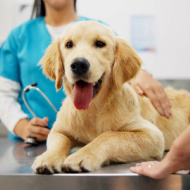
Review finds conflicting information in veterinary literature.
Researchers at the University of Nottingham are calling for more studies to understand how the timing of neutering impacts dog health.
Previous research on neutering female dogs suggests that the effects of neutering relate to age for some diseases. However, these studies vary in populations and methodology, which complicates comparisons.
The review, led by Dr Rachel Moxon from the University of Nottingham, examined the literature on neutering and its timing in relation to puberty on five health outcomes: atopy, developmental orthopaedic disease, neoplasia, and urogenital disease.
It found a lack of evidence on the health impacts of neutering around puberty, and stressed the importance for vets and owners to consider this when deciding on when to neuter.
Rachel explained: “Conflicting information in the veterinary literature regarding the beneficial and detrimental impacts of neutering at different times makes decisions regarding the best time to neuter female dogs difficult for pet dog owners, and providing advice to owners difficult for veterinarians.
“Similar to the findings of another review by this research group that looked at the effects on behaviour, this review has identified a lack of evidence related to the impacts of neutering female dogs before or after puberty on five aspects of health.
“Studies generally propose that neutering female dogs earlier appears to be protective for some, but not all, cancers, but increases the risk of developmental orthopaedic disease and potentially urinary incontinence; contrasting results that make applying the findings to benefit female dog health difficult.”
The study, Effect of neutering timing in relation to puberty on health in the female dog–a scoping review, is published in Plos One.
Image (C) Shutterstock.



 A free webinar exploring the development of the Kennel Club's registration system and the evolution of closed breed registers has been announced.
A free webinar exploring the development of the Kennel Club's registration system and the evolution of closed breed registers has been announced.